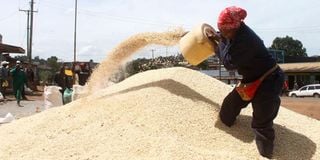State mustn’t breach investors’ trust

Farmers dry maize in Elburgon town, Nakuru County, on January 22, 2022. In July 2022, the government rolled out a maize subsidy programme that was aimed at protecting consumers from skyrocketing maize flour prices.
For businesses, these are very scary times. I am worried about the extent our capital city — Nairobi — is becoming increasingly fragile and vulnerable to street protests and demonstrations.
Today, any mere mention of a planned protest rally or street demonstration inevitably sends the capital into a state of panic and paralysis.
We always knew that the phenomenal growth of informal sector settlements was a growing time bomb in terms of security of the city.
But what we are seeing now points to a worsening situation in terms of the ability of the millions living in densely populated settlements such as Huruma, Kayole, Dandora, Kariobangi, Pipeline Estate Kawangware, Kibra and Mathare to push us to the political cliff edge.
Worse, it seems that the police don’t have the capacity to insulate the business community from the effects of political riots and demonstrations.
That is the much I will say today about events that are still unfolding. What I want to comment about today is a trending phenomenon I describe as the rising incidence of breaches of faith on the part of the government in its dealings with the private sector.
I want to argue that business activity and entrepreneurship thrive better where there is a belief that the government will always act on the principle of honour and good faith and that erosion of investor confidence, resulting from mindless instability of government policy, is a big deterrent to investment.
Enough of theory. In July 2022, the government rolled out a maize subsidy programme that was aimed at protecting consumers from skyrocketing maize flour prices.
Under the plan, the price of a 2kg packet of maize flour was to be brought down from the prevailing retail price of Sh230 to Sh100. The programme ran for a period of four weeks — between July 22, 2022, and August 17, 2022.
At that time, the government anticipated that prices would stabilise as the projection was that prices would stabilise in response to the impact of better supply conditions from harvests after the long rainy season.
Consequently, the government signed contracts with a total of 129 private millers who were expected to supply maize flour to consumers at subsidised prices. How were the millers to be paid?
The government said it would create a special Escrow account that would be drawn down and that was supposed to hold resources to cover the entire period of the subsidy. Alternatively, the government proposed that it would open LCs confirmed by strong local banks on behalf of the millers.
Curb arbitrage
To ensure transparency and accountability in the process and to curb arbitrage and corruption, the government stationed its staffers at the millers’ premises to constantly monitor purchases of maize, production of flour and sales to retailers.
Millers had to give delivery notes and invoices on daily production to the government staffers. And there was a multi-disciplinary ‘command centre’ that received and audited a total of 1,057 invoices, validating accuracy and completeness.
Enough of detail. The point here is that six months later, the government is yet to pay the millers an estimated Sh 2.5 billion in subsidy payments. Food subsidy programmes all end up being messy in this country.
But we must remember that the responsibility of policing this programme and maintaining transparency and accountability was in the hands of the state.
If there are legitimate reasons to suspect false claims, the government should go ahead and investigate. But the current situation can only worsen the liquidity constraints facing maize millers. Sandwiched between rising costs, low capacity utilisation rates, and constrained effective demand, millers are going through a very difficult phase. You can’t require firms to operate at a loss.
Such breaches of faith can only lower the credibility of the government and shake the trust of confidence by the private sector in the state. And, the government must respect and honour what has been agreed upon with organised industry.
The need of the hour today is cooperation, not confrontation, with industry. It is to the millers’ association that the government will still return when it is forced to implement another maize subsidy programme in future.
Long term, we will need to debate the effectiveness and equitability of food subsidies and seriously review the policy of providing consumers with price relief through subsidising maize to millers.
Subsidies can be a drain on government resources if made available to everybody, including those who are relatively well-off. A targeted cash transfer programme aimed at poor households can cost much less.
Today, the tendency is for the government to go into implementing subsidies without thoroughly assessing fiscal consequences, the balance of payments effects and implications on production incentives.
The government should settle the billions it owes to millers because a financially strong and stable milling sector has major implications on food security. Widespread insolvency in this strategic sector is a prospect we must avoid at all costs.





